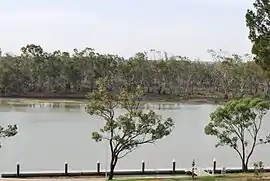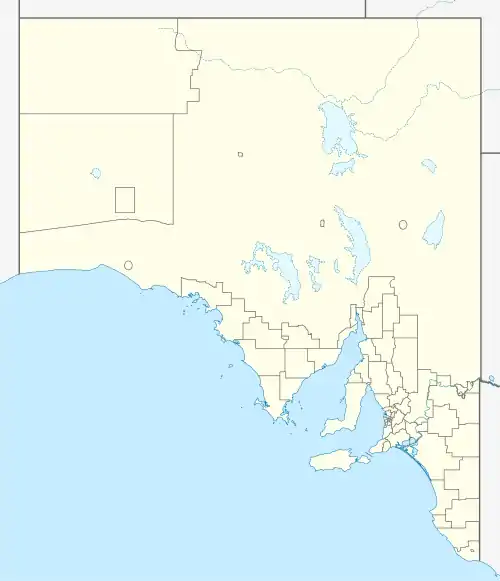| Katarapko South Australia | |||||||||||||||
|---|---|---|---|---|---|---|---|---|---|---|---|---|---|---|---|
 Katarapko as viewed from Loxton. | |||||||||||||||
 Katarapko | |||||||||||||||
| Coordinates | 34°23′25″S 140°33′43″E / 34.390180°S 140.561990°E[1] | ||||||||||||||
| Population | 0 (2016 census)[2] | ||||||||||||||
| Established | 12 August 1999[3] | ||||||||||||||
| Postcode(s) | 5343[4] | ||||||||||||||
| Time zone | ACST (UTC+9:30) | ||||||||||||||
| • Summer (DST) | ACST (UTC+10:30) | ||||||||||||||
| Location | |||||||||||||||
| LGA(s) | Berri Barmera Council[1] | ||||||||||||||
| County | Hamley[1] | ||||||||||||||
| State electorate(s) | Chaffey[5] | ||||||||||||||
| Federal division(s) | Barker[6] | ||||||||||||||
| |||||||||||||||
| |||||||||||||||
| Footnotes | Distances[4] Adjoining localities[1] | ||||||||||||||
Katarapko is a locality in the Australian state of South Australia located in the Riverland about 188 kilometres (117 miles) north-east of the state capital of Adelaide and about 6.6 kilometres (4.1 mi) north of Loxton.[4]
During World War II, Katarapko Island was the site of the Katarapko Wood Camp, one of three prisoner camps in the area attached to the main Loveday Camp complex.[8] The others were located at Moorook West and Woolenook.
Its boundaries were created in 1999 along with the selection of its name which was derived from Katarapko Island.[1] Its extent includes all of Katarapko Island and some land located to the immediate west of the island. It is bounded on all sides by the following watercourses with exception to part of its western and northern sides - the Katarapko Creek and the Murray River.[1] The southern boundary was revised in 2014 to "ensure the whole of Kapunda Island is within the rural locality of Loxton."[1]
The land within the locality is zoned for conservation with the locality being completely occupied by most of the Katarapko section of the Murray River National Park.[1][9][10][11]
The 2016 Australian census which was conducted in August 2016 reports that Katarapko had a population of zero.[2]
Katarapko is located within the federal division of Barker, the state electoral district of Chaffey and the local government area of the Berri Barmera Council.[1][5][6]
References
- 1 2 3 4 5 6 7 8 9 "Search results for 'Katarapko, LOCB' with the following datasets selected - 'Suburbs and localities', 'Counties', 'Local Government Areas', 'SA Government Regions' and 'Gazetteer'". Location SA Map Viewer. South Australian Government. Retrieved 2 April 2019.
- 1 2 Australian Bureau of Statistics (27 June 2017). "Katarapko". 2016 Census QuickStats. Retrieved 2 December 2018.
- ↑ Lawson, Robert (12 August 1999). "GEOGRAPHICAL NAMES ACT 1991 Notice to Assign Names and Boundaries to Places" (PDF). The South Australian Government Gazette. Government of South Australia. p. 765. Retrieved 31 March 2019.
DO HEREBY assign the names OVERLAND CORNER, COBDOGLA, LOVEDAY, BARMERA, WINKIE, KATARAPKO, MONASH, GLOSSOP, BERRI, GERARD and SPECTACLE LAKE to those areas within The Berri Barmera Council (sic)
- 1 2 3 "Katarapko, South Australia (Postcode)". postcodes-australia.com. Retrieved 31 March 2016.
- 1 2 "District of Chaffey Background Profile". ELECTORAL COMMISSION SA. Retrieved 31 March 2016.
- 1 2 "Federal electoral division of Barker, boundary gazetted 16 December 2011" (PDF). Australian Electoral Commission. Retrieved 31 March 2016.
- 1 2 3 "Monthly climate statistics: Summary statistics LOXTON RESEARCH CENTRE (nearest station)". Commonwealth of Australia , Bureau of Meteorology. Retrieved 31 March 2016.
- ↑ "History". Loveday Lives. Retrieved 8 October 2023.
- ↑ "Murray River National Park, Katarapko (map)" (PDF). Natural Resources SA Murray-Darling Basin. 2014. Retrieved 31 March 2016.
- ↑ "Development Plan, Berri Barmera Council Consolidated – 29 November 2012" (PDF). Department of Planning, Transport and Infrastructure. pp. 111, 191, 192 & 260. Retrieved 31 March 2016.
- ↑ "Murray River National Park Management Plan (including Rilli Island, Media Island and Kapunda Island Conservation Park)" (PDF). Department for Environment and Natural Resources. 1994. pp. Figure 2. Retrieved 16 January 2015.